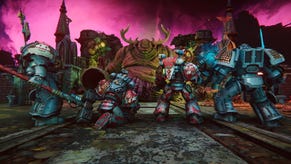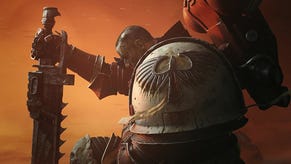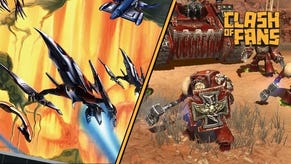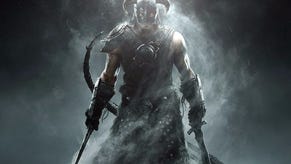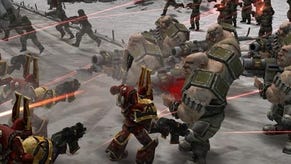Warhammer 40,000: Dawn of War
Considerable improvements over last year's Warhammer 39,999.
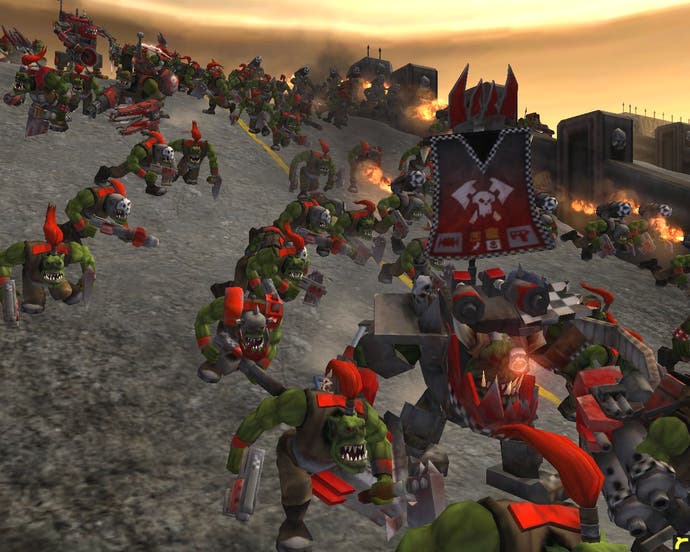
Both for newcomers and the initiated, I think it's worth taking a few moments to reiterate what the Warhammer 40,000 universe is all about. Bear with me. If we're exceedingly lucky, we'll chance upon a point.
It's the 40th millennia. This Dark Age, after the fall of Man. Humanity's domain is a million worlds, governed by a fascistic theocracy with a God-Emperor worshipped as a bona-fide deity. This man would be dead - in fact, it's entirely possible that he is dead - were not for the fact that an enormous baroque machine siphons the souls of thousands of psychics every day. A vast Inquisition gathers these frightening minds, between performing purges across human space, persecuting and executing untold billions, with rebel planets following rival creeds regularly suffering sterilisation bombardments from space. There is no hope, no truth, no peace, no love: only War.
And these are the good guys.
The 40K universe was invented in the eighties as Games Workshop took their pre-existing fantasy - also determinedly grim - franchise into a far gothic future. The reason why the Imperium, as man's domain is known, are the good guys is the alternatives are even worse (i.e. even more apocalyptic). A jackboot stomping on a human face forever is preferable to being rendered immortal by one of the Chaos powers then having your organs re-arranged as a fashionable hat. In short, 40K has everything required to power a brilliant videogame.
And it really does have everything - it's very much a maximalist creation, baroquely taking from every science-fiction convention and forming it into a glistening fleshy sticky whole. Brilliant character design - in fact, so brilliant that their influence is seen in more than half the science-fiction videogames in existence. A scenario where improbably violent conflict naturally emerges from its licence rather than feeling crammed in. And ludicrously sized guns.
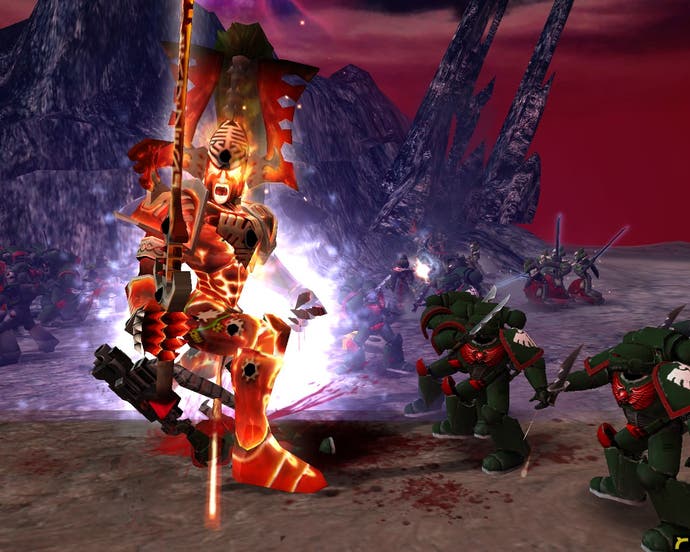
Dawn of War just nails it.
Now, 40K hasn't been as badly treated in games as legend would have it - the pair of EA Space Hulk games can justify the lineage by themselves - but nothing has been even a fraction as successful as exploiting the possibilities of the licence as this has. It's a perfect gaming world, being exploited perfectly, for the first time. That alone deserves some kind of applause, and that alone is going to gather some serious sales for Games Workshop's army of fans - and those who would be fans if they could spare the time and money to create a huge army. And, since the universe really is ideal fodder for a videogame, the point of this extended rambling intro, pretty much anyone else who likes their RTS to be lively and bloody too.
In terms of the pure RTS, it's the most attractive yet seen. It's all in the details and the illusion of life, and the animation. The characters bubble with personality and - in many cases - barely restrained violence. Seeing the Avatar of Khaine tear its way through a rank of hapless yelping-goblinoid Gretchin is a thrilling sight.
This season there are, essentially, three contenders for your strategy money. Kohan 2, Rome: Total War and this. Out of the three, it's Dawn of War which is closest to the entral mainstream - for that read "Whatever Blizzard are doing". Kohan 2 interests in how it elegantly and intelligently deviates from the formula. Total War, in the best tradition of British developers, doesn't give a damn what the colonials are up to, and carries on building its Roman Road to the future in a manner unlike anyone else. While there are moments Dawn of War does something unexpected, it's instantly familiar and recognisable to anyone who's dabbled in Starcraft. The population of Korea will feel very much at home.
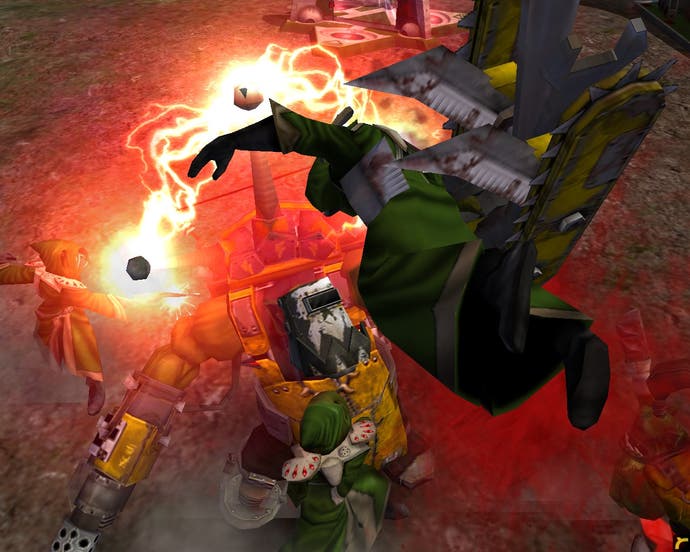
But that undersells Dawn of War. Its animation, while glorious, isn't just for vicious kicks. For example, touches like a squad being sent flying by a grenade or lobbed over the horizon by a Dreadnought, the Marine's hulking mechanical walkers, create a direct impact in what weapons are used where, as well as looking spectacular.
Since so much is familiar, you may... well, think it a little shallow. While we'll only be able to tell for certain the truth of the matter a year of multi-playing down the line, there's actually considerable subtlety available to a player. Take, for example, the standard Space Marine (the Imperium's super-human armoured warriors) squad. Once created, you're given options of either keeping with the basic squad size, or pushing it up to a cap. Equally, as the research tree opens up, you get the option of paying for up to four heavy weapons (from four separate sorts) for the squad. Each of the four heavy weapons have their own uses and disadvantages, and there's even an argument not to take them, since you have to stay stationary for a period prior to firing. Expanding out to the entire army, there's certainly a lot to think about and options to process, and while its classical nature means it's going to descend into a giant scrum upon occasion, it's underestimating its potential to think that's all it is.
The multiplayer is very much the centre of the game. The eleven-mission campaign , while put together competently, will be marched through swiftly by vaguely competent players. In terms of narrative, it's tied together by a story which leans on the major themes of the 40K universe: corruption of the Imperium by Chaos. It aspires to competency and almost reaches the mark, mainly stumbling by failing to introduce the principle sides in any real way. If, for example, you don't know who the Eldar are or what they're doing on the planet, you'll be none the wiser for playing. And if you want to actually play the Eldar single-player... Well, it's off to the fairly standard skirmish mode for you. Only one campaign, with you stuck as the Marines, is available, which seems more than a little on the mean side.
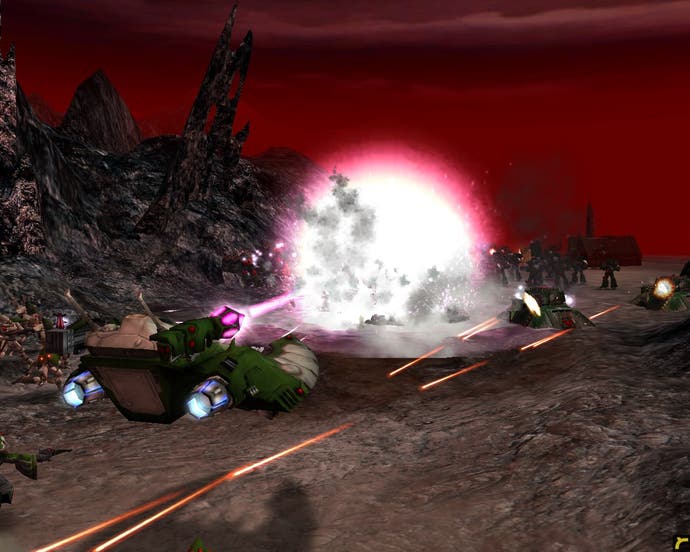
Which is a backhanded compliment towards the quality of the four sides: due to the unique flavour, you do want to play them all. The Orks (Space Orks!) favour mobs - in fact, have their build options limited until they reach a certain critical mass of bodies. The Eldar (Space Elves!) are delicate and evasive, with each unit type having a clear role in which it excels. The Marines (Er... Space Marines?) are a resilient all-round army, which can be customised considerably on the fly. And the Chaos side mixes their elite Chaos Marines with cannon-fodder mobs and frankly terrifying summoned Daemons. And for a non-backhanded compliment to their quality, I honestly don't have a favourite. They all charm.
And it's charm which cements Dawn of War in the affections. In fact, it charms so casually that the contrary parts of the gaming world will just lazily dismiss it as a bimbo. It really isn't. Charm lures us in, but there's enough happening upstairs to keep it firmly in our affections.
Though whether "charm" really is the right word where by "charm" you mean "the visceral thrill when you see an Ork advance rent asunder by giant pincers" is a matter I leave to you.
Order yours now from Simply Games.

